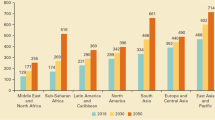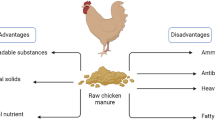Abstract
Research efforts have been directed at the use of non-conventional feed ingredients of agro-industrial origin in the poultry industry. Cassava tuber wastes (CTWs) such as the peels, sievates or pulp waste, cassava whey and cassava starch residues are part of such ingredients. Thus, there is need to evaluate their impact in the poultry industry. This experiment was conducted to evaluate the effect of feeding microbe-fermented CTWs to cockerels using performance parameters and the cost of production as response criteria. Two hundred and ten cockerel chicks were randomly assigned to the seven treatment diets in a 16-week feeding trial. Seven diets were formulated containing 0% CTWs, 20, 40 and 60% microbe-fermented cassava peel (MFCP), 20, 40 and 60% microbe-fermented cassava starch residue (MFCSR). The results showed 20% MFCP had similar (P = 0.02) feed conversion ratio to the control. Furthermore, the cost of feed per kg decreased with increasing level of CTWs. In addition, the cost of production per kg body weight gain decreased with increasing inclusion level up to 20% MFCP and 40% MFCSR. It was concluded that the inclusion of 20% MFCP and up to 40% of MFCSR in cockerels’ diet would not adversely affect growth and economics of production.
Graphic Abstract

Similar content being viewed by others
Data Availability
The datasets generated and analysed during this study are available from the corresponding author on reasonable request.
References
Adegbeye, M.J., Salem, A.Z.M., Reddy, P.R.K., Elghandour, M.M.E., Oyebamiji, K.J.: Waste recycling for the eco-friendly input use efficiency in agriculture and livestock feeding. In: Kumar, S., Meena, S., Jhariya, M.K. (eds.) Resources Use Efficiency in Agriculture, pp. 1–45. Springer, Singapore (2020)
Aro, S.O., Aletor, V.A.: Proximate composition and amino acid profile of differently fermented cassava tuber wastes collected from a cassava starch producing factory in Nigeria. Livest. Res. Rural. Dev. 24, 102 (2012)
Adegbeye, M.J., Ravi Kanth Reddy, P., Obaisi, A.I., Elghandour, M.M.Y., Oyebamiji, K.J., Salem, A.Z.M., Morakinyo-Fasipe, O., Cipriano-Salazar, M., Camacho-Díaz, L.M.: Sustainable agriculture options for production, greenhouse gasses and pollution alleviation, and nutrient recycling in emerging and transitional nations: an overview. J. Clean. Prod. 242, 118319 (2020)
Aro, S.O., Growth and reproductive response of swine fed fermented cassava tuber wastes. Ph.D. thesis, University of Ibadan, pp. 176. (2010)
SPSS: Statistical Package for Social Scientists, Version 18.0 IBM SPSS. Prentice Hall, Hoboken (2011)
Elghandour, M.M.Y., Adegbeye, M.J., Vellejo, L.H., Elahi, M.Y., Barbabosa-Pilego, A., Recillas, S., Salem, A.Z.M.: Role of dose dependent Lactobacillus farciminis exhibits ruminal microflora biogasses and fermentation activities of three silage-based rations. J. Appl. Microbiol. 127, 1627–1634 (2019)
Izuddin, W.I., Loh, T.C., Samsudin, A.A., Foo, H.L.: In vitro study of postbiotics from Lactobacillus plantarum RG14 on rumen fermentation and microbial population. Rev. Bras. Zootec. 47, 1–7 (2018)
Ahou, Y.S., Bautstita Angeli, J.R., Awad, S., Baba-Moussa, L., Andre, Y.: Assessment of inoculum to substrate ratio to recover energy from cassava wastes through anerobic digestion. Waste Biomass Valoris. 12, 1891–1900 (2021)
Tewe, O.O.: Enhancing the nutritive value of cassava for livestock feeding through microbial degradation. Paper presented at the 3rd international scientific meeting of the cassava biotechnology network (CBNIII), Kampala, Uganda, 27-1996 (1996)
Maust, L.E., Pond, W.G., Choun, M.L.: Energy value of cassava- maize based diet with and without supplemental zinc for growing poultry. J. Anim. Sci. 35, 935–957 (2000)
Onjoro, P.A., Bhattacharjee, M., Ottaro, J.M.: Bioconversion of cassava tuber by fermentation into broiler feed of enriched nutritional quality. J. Root Crop 24, 105–110 (1998)
Onyimoyi, A.E., Ugwu, S.O.C.: Bio-economic indices of broiler chicks fed varying ratios of cassava peel/bovine blood. Asian Netw. Sci. Info. 6, 318–321 (2007)
Sultana, F., Ali, M.A., Jahan, I.: Growth performance meat yield and profitability of broiler chickens fed diets incorporating cassava tuber meal. J. Environ. Sci. Nat. Resour. 5(1), 47–53 (2012)
Adedokun, O.O.: Carcass characteristics, organ proportion and economics of broiler chickens fed graded levels of processed Manihot esculenta crantz (var. Umucas 36) cassava composite meal. Niger. J. Anim. Sci. Technol. 2(3), 46–54 (2019)
Acknowledgements
The authors express their profound gratitude to the World Bank Assisted Centre of Excellence for Food Security of the Federal University of Technology Akure-Nigeria, for their financial support.
Funding
This study was not funded by any institution or any other entity.
Author information
Authors and Affiliations
Contributions
SOA conceived, designed and supervised the experiment. SOA/OAK/AFO did the field and laboratory works. SOA/OAK/AFO did the statistical analysis of the data. OAK/AFO/MJA, wrote while SOA and AZMS, MMMYE proofread the article. All authors approved the submission of the article in its present form and gave consent for its publication.
Corresponding author
Ethics declarations
Conflict of interest
The authors declare that they have no conflict of interest.
Ethical Approval and Consent to Participate
This study was conducted according to the research ethics approved by the committee on research of the School of Agriculture and Agricultural Technology, the Federal University of Technology, Akure, Nigeria.
Additional information
Publisher's Note
Springer Nature remains neutral with regard to jurisdictional claims in published maps and institutional affiliations.
Rights and permissions
About this article
Cite this article
Aro, S.O., Kehinde-Olayanju, O.A., Aletor, V.A. et al. Effect of Microbial-Fermented Cassava Wastes as Dietary Replacement for Ground maize on Cockerel Production. Waste Biomass Valor 13, 361–367 (2022). https://doi.org/10.1007/s12649-021-01529-4
Received:
Accepted:
Published:
Issue Date:
DOI: https://doi.org/10.1007/s12649-021-01529-4




